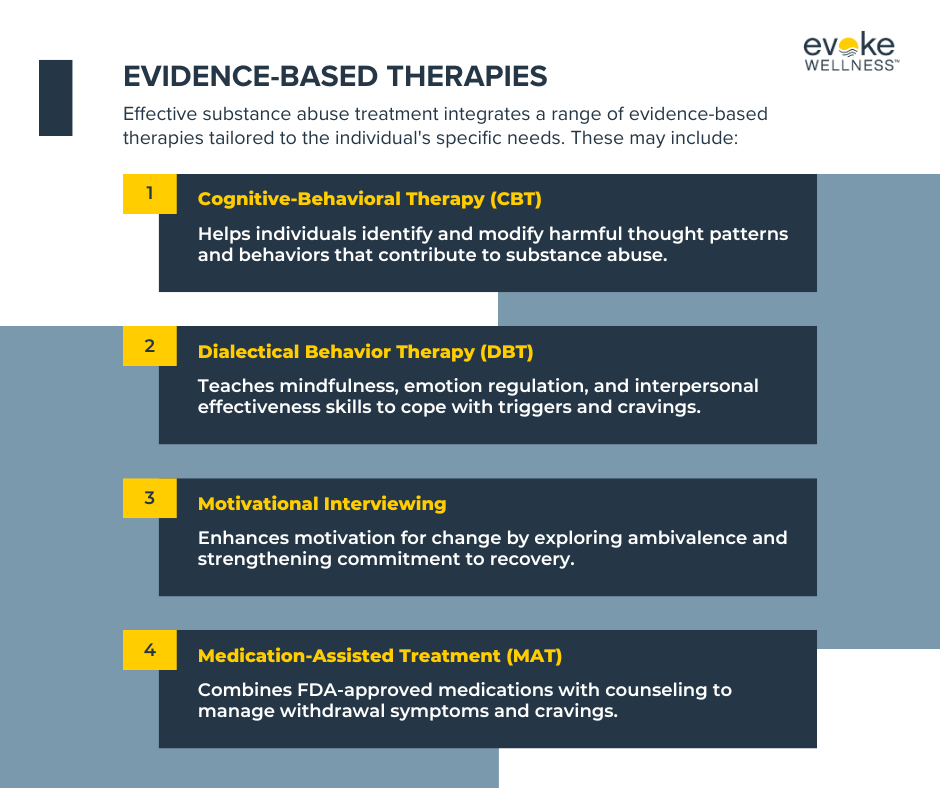When it comes to overcoming addiction, one size does not fit all. Your journey to recovery is as unique as you are, which is why tailored treatment plans are crucial for long-term success. Recent studies show that personalized approaches can increase recovery rates by up to 60%. At Evoke Wellness at Waltham, we understand the complex interplay between substance abuse and mental health. Our comprehensive programs integrate evidence-based therapies, addressing both your immediate needs and underlying issues. By customizing your treatment plan, we empower you to build a strong foundation for lasting sobriety. Discover how a personalized approach can transform your recovery journey and help you reclaim your life.
Together, let’s embrace the journey to recovery and the promise of a new beginning. Call us at (833) 287-7223 today or reach out online.
The Importance of Individualized Substance Abuse Treatment
Overcoming addiction is a deeply personal journey, with no one-size-fits-all solution. Each individual’s path to recovery is shaped by a unique set of circumstances, challenges, and needs. That’s why tailored, individualized treatment plans are crucial for addressing the complexities of substance abuse and achieving lasting sobriety.
Comprehensive Assessments
The first step in crafting an effective, personalized treatment plan is a thorough assessment by experienced professionals. This evaluation considers factors such as the severity of addiction, co-occurring mental health disorders, medical history, and social and environmental influences. By gaining a holistic understanding of the individual’s situation, clinicians can design a customized approach that targets the root causes of their substance abuse.
Addressing Co-occurring Disorders
For many individuals struggling with addiction, co-occurring mental health disorders like depression, anxiety, or trauma-related conditions can significantly impede recovery efforts. Individualized treatment plans address these dual diagnoses simultaneously, integrating therapies like trauma-focused interventions and medication management to promote holistic healing.
Continuum of Care
Recovery is an ongoing process that extends beyond initial treatment. Tailored aftercare plans and support services, such as sober living facilities, alumni programs, and community resources, provide a continuum of care that reinforces the skills and strategies developed during treatment, reducing the risk of relapse and supporting long-term sobriety.
At Evoke Wellness at Waltham, our team of experienced professionals is dedicated to crafting individualized treatment plans that empower each individual on their unique journey to recovery. By addressing the multifaceted nature of addiction and providing comprehensive, personalized care, we increase the chances of achieving lasting sobriety and reclaiming a fulfilling, healthy life.
What are the Key Factors to Consider When Developing Individualized Treatment Plans?
Comprehensive Assessment
A thorough evaluation of the individual’s physical, mental, and emotional state is crucial for creating an effective treatment plan. This multi-dimensional assessment helps identify any co-occurring disorders, underlying issues, or environmental factors that may contribute to the addiction or mental health challenge. According to a study published in the Journal of Substance Abuse Treatment, comprehensive assessments lead to more accurate diagnoses and better treatment outcomes.
Personalized Goals and Preferences
Individualized treatment plans should align with the patient’s personal goals, values, and preferences. Some may prioritize complete abstinence, while others may aim for harm reduction or moderation. Factors like cultural background, lifestyle, and support system should also be considered. By incorporating the patient’s input, the treatment plan becomes more tailored and increases the likelihood of long-term success.
Evidence-Based Therapies
Effective treatment plans integrate evidence-based therapies proven to address substance abuse and mental health disorders. Cognitive Behavioral Therapy (CBT), Dialectical Behavior Therapy (DBT), and mindfulness practices are among the scientifically-backed approaches often incorporated into individualized plans. These therapies help patients develop coping mechanisms, modify unhealthy thought patterns, and build resilience.
Continuum of Care
Recovery is an ongoing journey, and individualized treatment plans should consider the full continuum of care. This may involve transitioning from intensive inpatient or residential programs to outpatient or day treatment as the patient progresses. Aftercare planning, including relapse prevention strategies, peer support groups, and ongoing counseling, is essential for maintaining long-term recovery.
By carefully considering these key factors, treatment providers can develop comprehensive, personalized plans that address the unique needs of each individual. This tailored approach increases the likelihood of successful outcomes and empowers individuals to achieve lasting recovery and improved mental well-being.
The Four Elements of an Effective Treatment Plan
An effective addiction treatment plan is comprehensive, addressing the multifaceted nature of substance abuse and promoting long-term recovery. At Evoke Wellness at Waltham, our personalized treatment plans incorporate four essential elements to support individuals on their journey to sobriety.
Evidence-Based Therapies
Grounded in scientific research, evidence-based therapies form the foundation of our treatment approach. Cognitive-behavioral therapy (CBT) and dialectical behavior therapy (DBT) are widely utilized to reshape thought patterns, develop coping strategies, and promote behavioral change. According to the National Institute on Drug Abuse, these therapies have proven effective in treating substance use disorders and co-occurring mental health conditions.
Holistic Healing Practices
Addiction recovery extends beyond addressing substance abuse alone. Our holistic healing practices, such as nutrition counseling, exercise programs, and mindfulness practices, promote overall well-being and equip individuals with healthy coping mechanisms for stress management and self-care.
Personalized and Multidisciplinary
Every individual’s journey to recovery is unique, which is why our treatment plans are tailored to address each person’s specific needs, goals, and challenges. Our multidisciplinary team of medical professionals, therapists, and support staff collaborates to provide comprehensive care, ensuring all aspects of addiction and co-occurring disorders are addressed.
Ongoing Monitoring and Aftercare
Recovery is an ongoing process that extends beyond the initial treatment phase. Our team closely monitors progress and makes adjustments as needed, ensuring the treatment plan remains effective and responsive to each individual’s evolving needs. We also prioritize aftercare planning, providing resources and support for long-term recovery through sober living arrangements, peer support groups, and relapse prevention strategies.
At Evoke Wellness at Waltham, our commitment to evidence-based, personalized, and comprehensive treatment plans empowers individuals to overcome addiction and reclaim their lives. By addressing the physical, psychological, and emotional aspects of substance abuse, we create a solid foundation for lasting recovery and improved overall well-being.
The Four Components of an Effective Substance Abuse Treatment Plan
Overcoming addiction is a challenging journey, but a comprehensive treatment plan can significantly increase the chances of long-term recovery. An effective substance abuse treatment plan typically consists of four key components, each designed to address specific aspects of the recovery process.
1. Medical Detoxification
For individuals with severe substance dependencies, the first step is often medical detoxification. This process involves safely managing withdrawal symptoms under professional medical supervision. According to a study by the National Institute on Drug Abuse (NIDA), detoxification alone is rarely sufficient for long-term recovery, but it can help individuals safely navigate the initial stages of withdrawal and prepare them for further treatment.
2. Intensive Inpatient or Outpatient Rehabilitation
After detoxification, the next phase involves intensive rehabilitation through either an inpatient or outpatient program. Inpatient programs offer a highly structured environment with round-the-clock support, while outpatient programs provide more flexibility for those with work or family obligations. According to the Substance Abuse and Mental Health Services Administration (SAMHSA), both approaches should incorporate evidence-based therapies, such as cognitive-behavioral therapy (CBT), contingency management, and motivational interviewing, to address the underlying causes of addiction and develop coping strategies.
3. Integrated Mental Health Treatment
Substance abuse disorders often co-occur with mental health conditions like depression, anxiety, or trauma-related disorders. A study published in the Journal of the American Medical Association (JAMA) found that individuals with co-occurring disorders have better treatment outcomes when both conditions are addressed simultaneously. Integrated mental health treatment, which may include individual or group therapy, medication management, and holistic approaches like mindfulness and yoga, is crucial for achieving long-term recovery.
4. Comprehensive Discharge Planning and Follow-up Care
The journey to recovery doesn’t end with the completion of a rehabilitation program. Research by NIDA highlights the importance of ongoing support and aftercare to maintain sobriety and prevent relapse. Comprehensive discharge planning should include strategies for transitioning back into daily life, such as sober living arrangements, participation in support groups, and continued therapy or counseling sessions.
By integrating these four components into a personalized treatment plan, individuals struggling with substance abuse can embark on a path towards lasting recovery, addressing not only the physical aspects of addiction but also the underlying psychological and emotional factors that contribute to substance use disorders.
Conclusion
In conclusion, tailored treatment plans are essential for effective addiction recovery. By addressing your unique needs and circumstances, these personalized approaches significantly increase your chances of long-term success. Recent studies show that individuals who receive customized care are 2.5 times more likely to maintain sobriety after one year compared to those in standardized programs. These components work together to create a comprehensive recovery strategy. As you embark on your journey to wellness, embrace the power of individualized care. With a tailored treatment plan, you’re not just fighting addiction—you’re reclaiming your life and building a foundation for a healthier, more fulfilling future.
Begin Your Journey with Evoke Wellness at Waltham
If you or a loved one is considering outpatient treatment, Evoke Wellness at Waltham invites you to contact us. Our compassionate team is ready to answer your questions, discuss your needs, and help you take the first steps toward recovery. At Evoke Wellness, you will find more than just a treatment program – you’ll discover a community dedicated to your wellness and success. Together, let’s embrace the journey to recovery and the promise of a new beginning. Call us at (833) 287-7223 today or reach out online.



